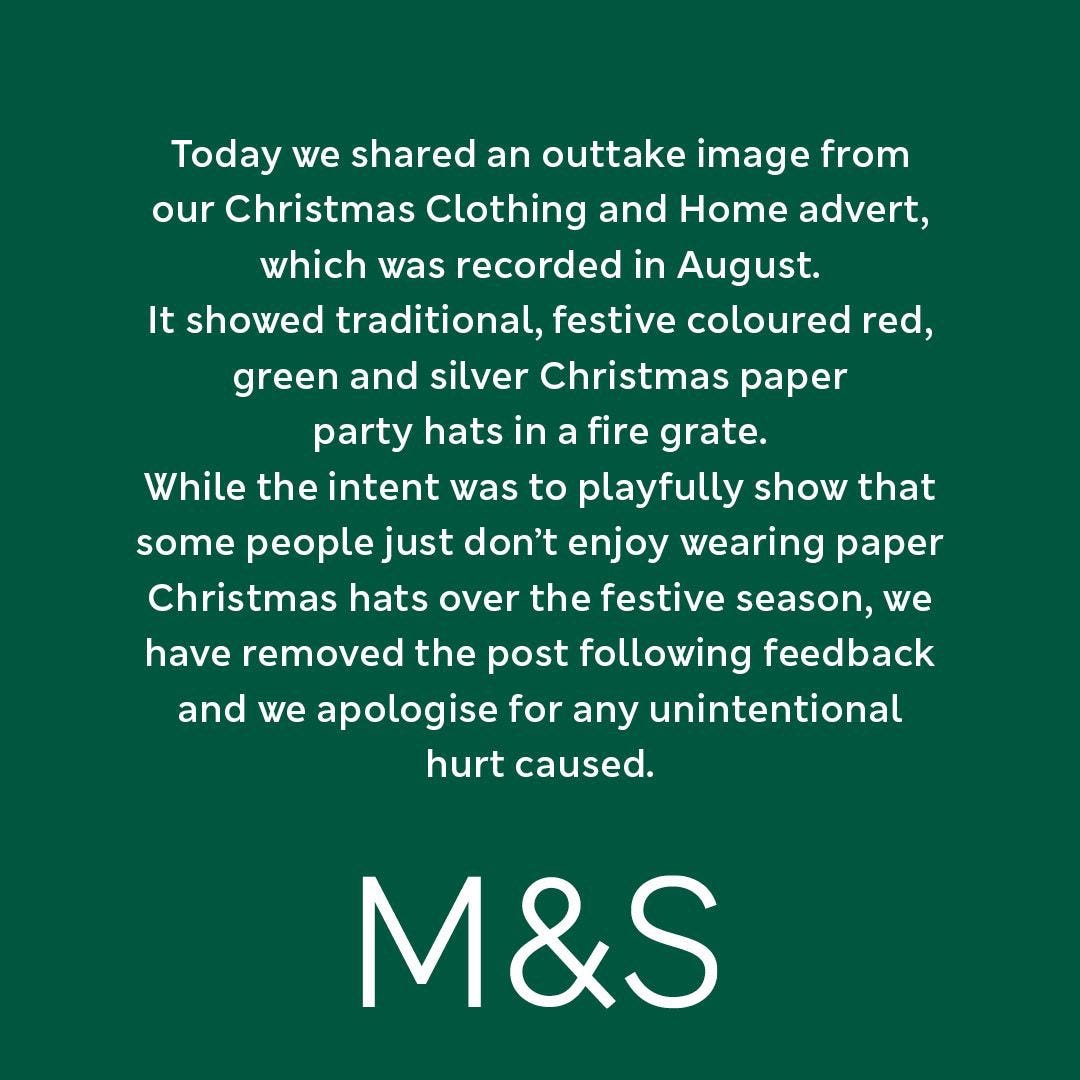This is not just craven hypocrisy; this is M&S craven hypocrisy
Retail giant's double standards prove that we have a de facto blasphemy law in Britain - only it doesn't apply to the dominant religion
Every now and then, the extent to which our leading institutions and corporations have been captured by woke ideology is laid bare. And sometimes their cowardice, too.
In a recent case involving the retail giant Marks and Spencer, we got two for the price of one.
I refer, if you hadn’t guessed already, to that company’s Christmas marketing campaign, which has sparked rather an intense public debate. Hardly surprising, given the mix of double standards and gutlessness displayed by M&S bosses in the face of assorted criticisms prompted by the campaign.
On 1 November, the firm released its clothing and home Christmas TV advert. (For all sorts of reasons, the ad provoked a fierce backlash, and I shall come to all that in a moment.) Later that day, the company’s marketing people posted an outtake from the ad on social media. The outtake captured the image of a few paper hats - red, green and silver paper hats, to be precise - burning in a fire grate (the point, pursuant to the overall theme of the campaign, being that the usual Christmas traditions drive us all mad - apparently - and we should do away with them).
Immediately the complaints and threats of a boycott began rolling in. The colours of the paper hats shown in the outtake were, it was said, identical to those of the Palestinian flag and, in the context of current events, M&S - which some complainants seemed extra keen to remind us had Jewish origins and sold goods produced in Israel - had offended all Palestinians and Muslims. No matter that the scene in question was recorded back in August - long before the latest round of the Israel-Hamas conflict broke out - or that, as it happens, the colours of the hats were not exactly the same as those of the Palestinian flag. But these facts were unimportant to the pitchfork-wielders.
Needless to say, M&S did what all private and public bodies do when faced with accusations of having offended Muslims: it capitulated. Within hours, the company has removed the contentious post from social media and issued a statement of apology for any ‘hurt caused’.
The firm’s mea culpa didn’t halt the brickbats being directed its way, mind. Such cravenness rarely does. Rather, it serves to embolden those who make the complaints and threats. Every time these offendotrons force a powerful institution to give way, they are more confident about doing it all over again - and with even more fury - the next time an opportunity arises.
M&S’s surrender has, however, served a wider purpose, in that it reminds us again that a de facto blasphemy law exists in Britain. This blasphemy law isn’t universal, of course. No, it applies only to those religions whose adherents are deemed to be the most zealous or violent. Which means, naturally, that the nation’s dominant religion - the one in which so much of our heritage, culture, art, literature, music and law is rooted - can consider itself exempt. See, the followers of Christianity are just too meek, too unwilling to go to the wire in defence of their faith. Thus, they and their beliefs may be lampooned and insulted at will.
Don’t misunderstand me; I’m not suggesting that any religious creed should be ringfenced from scrutiny or criticism. On the contrary, all belief systems - religious, political or otherwise - must be open to challenge. My point is that, in the minds of some, there appears to exist a sort of hierarchy of sensitivity towards the causing of ‘offence’.
By way of evidence of this phenomenon, we need only look at what happened next in the M&S affair. The advert from which the contentious outtake was snatched was heavily promoted by the company on the day of its release. It featured various celebrities participating resentfully in sundry festive activities: a woman making a model snowman, another toasting a gingerbread house with a kitchen blow torch, a man decorating a tree, and a family playing charades. (True to the spirit of the age, the ad was, of course, an exercise in in-your-face hyper-diversity. But I digress.)
Suddenly, the resentment turns to anger, and the characters engage in a spot of anti-yuletide vandalism: the blow torch is used to set light to a pile of Christmas cards, an elf is clobbered off the roof of a house, a board game is upturned, and some party hats are chucked in a bin. Meanwhile, a voiceover tells us that, this Christmas, we should do only what we love.
In other words, M&S took one of the few events that still have the ability to bring people together in this country - an event at whose heart lies the principles of selflessness and giving - and encouraged us instead to be selfish and do as we please. Quite a bold move, some might say, for a major brand to peddle such an explicitly anti-Christmas message in its Christmas advert.
In publishing the outtake of the paper hats burning in the fire grate, M&S had, as everyone must have realised, not intended to cause offence. Thus, the ensuing outrage was entirely synthetic, the complaints unmeritorious, and the firm’s apology unnecessary. The messaging behind the advert itself, on the other hand, was most definitely deliberate, and the resulting public disquiet (note: not threats of violence or holy war) therefore understandable.
Yet, in the wake of the disapproval, did M&S offer any sort of apology to those - Christians and non-Christians alike - who value Christmas, and its message, as an essential part of our national fabric and found the advert crass and insensitive? Did it hell!
The firm’s conduct screamed of double standards. If you doubt that, then try to imagine M&S commissioning an advert for Eid or Diwali which mocked the traditions of those festivals and trashed the various trinkets and decorations associated with them. You can’t, can you? And if the company had commissioned such an advert, it cannot seriously be doubted that it would have apologised in a heartbeat in the face of the inevitable outcry.
M&S understood by contrast that a Christian festival was an easy target. That’s why the firm felt entirely comfortable about commissioning the ad in question. Well, that and the fact that the marketing departments of corporate giants tend to be filled these days with postmodernist, hyper-liberal, individualistic, young, 'progressive', graduate types who despise anything that smacks of tradition, religion and cultural mores.
Except when it comes to certain traditions, religions and cultures, of course. Then their edginess suddenly deserts them.
I was struck by media reports this week of an incident that occurred in York. A man had fallen into the River Ouse in that fine city, and a crowd looked on as he struggled to stay afloat. No-one troubled to throw him a life ring (despite the fact that two were located nearby), and some bystanders were reported to have taken selfies at the river’s edge. Only when police arrived on the scene were rescue efforts attempted.
It is undeniable - is it not? - that we live in a very different society to the one in which most of us grew up.
I popped up twice as a panellist on GB News last week. The first time on Dewbs & Co.; the second on GB News Sunday. Both programmes can be viewed below.
A reminder that you can follow me on X (formerly known as Twitter) here: @PaulEmbery



